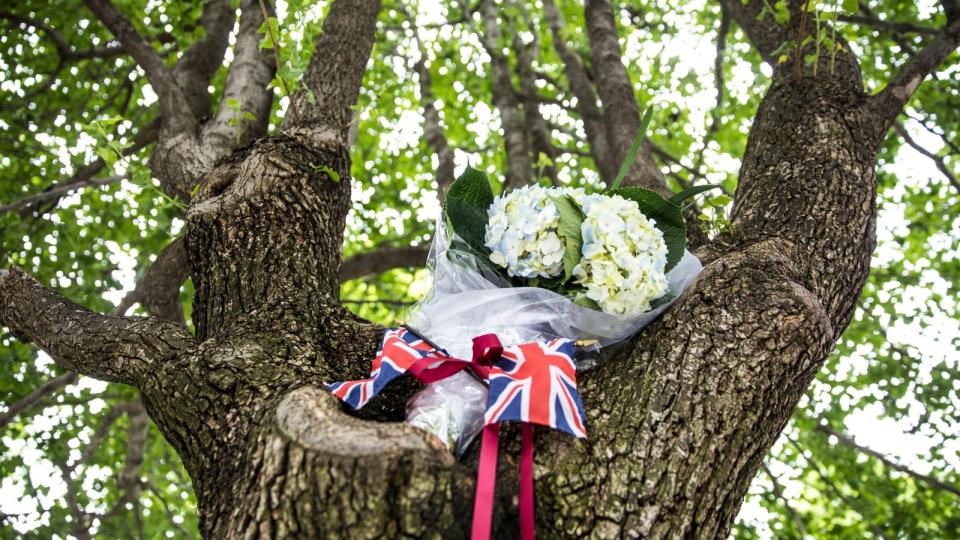Make a donation to the museum
British Victim Advocate Who Survived Terrorist Attack Takes Inspiration from 9/11 Community
British Victim Advocate Who Survived Terrorist Attack Takes Inspiration from 9/11 Community
- August 21, 2022

After the 2017 Westminster Bridge terrorist attack in London left him seriously injured, Travis Frain became an advocate for victims of similar past — and future — acts of violence. Next month, to coincide with the 21st anniversary of the September 11th attacks, Frain will visit the Memorial & Museum to meet and exchange stories with our Visionary Network. Today, on the United Nations International Day of Remembrance and Tribute to Victims of Terrorism, he explains how terrorism reshaped his perspectives and talks about the way the 9/11 community inspires his work.
The September 11th attacks have long been viewed as a watershed moment, the culmination of multiple attempted and successful attacks by religious extremist groups in the years preceding that set the stage for many of the attacks that would follow in the next decade.
But just as the attacks on September 11th provided inspiration for other terrorists around the world, the courageous actions of so many victims and responders on that fateful day in 2001 and over the years following, have provided a stark reminder to the rest of society that our resilience and community can defeat those who would seek to divide us.
From the bravery of civilians and first responders who rushed towards the Twin Towers and the Pentagon, spending weeks afterwards searching through the rubble for survivors, to the innocent passengers onboard Flight 93 who fought back against the hijackers. From the survivors of the attacks who have tirelessly campaigned for compensation and medical assistance for their injuries, to those who helped bring the perpetrators to justice. Each of those affected by 9/11 has set the stage for those of us affected by future attacks, demonstrating how victims of horrific incidents can overcome the unique difficulty to do incredible good in the world.
I should know, I was injured in the Westminster Bridge terror attack in London in March 2017. The attacker drove his vehicle at pedestrians on the bridge before attempting to storm the Houses of Parliament with knives, killing five and injuring over 50. My friends and I were incredibly fortunate – we survived our injuries, but the effects will forever remain with us, a feeling I’m sure many of those impacted by 9/11 can relate to. I fractured each finger on my left hand except the thumb and fractured the hand itself, in addition to sustaining a shrapnel wound and fracturing my left leg in two places.
Once I’d recovered from my injuries, I couldn’t comprehend just returning to work and life as though nothing had happened. I felt I had to actively do something and try to find some positivity from something so awful. I began to share my story in schools and colleges around the UK in the hopes that by doing so I could raise awareness of terrorism and extremism, and shine a light on the work we can all do in our communities to keep an eye out for warning signs that someone may be on a path towards radicalization. It also provided an opportunity for me to talk about some of the areas where support for victims of terrorism is still lacking, with an aim towards improving this for future terrorism victims. In each of these aspects, I could find no greater example than that which has been set time and time again by the 9/11 community.
After four years’ work with Counter Terrorism Policing here in the UK, I was elected to chair Great Britain’s National Counterterrorism Youth Advisory Group. We work with young people up and down the country to educate them on the dangers of extremism and raise awareness of terrorism and counterterrorism. Those of us who have experienced such attacks firsthand, losing a loved one, running in to the fray to save others, or surviving injuries both physical and mental, know all too well the realities of terrorism. But I fear that for the rest of society these issues still remain to be seen as something that "affects others," believing that statistically it was very unlikely to happen to us. I know I was certainly guilty of this before I was injured. Thus the onus is on us as victims and survivors to drive these changes and raise awareness, for there can be no one with a greater respect for the dangers of extremism than those who have come face-to-face with terror, and no more credible a voice in counterterrorism.
I’m grateful to the 9/11 Memorial & Museum for allowing me the opportunity to write this guest blog on the United Nations International Day of Remembrance and Tribute to Victims of Terrorism. It’s incredibly significant that we as an international community of survivors support one another – fortunately it’s a small club, but that makes it all the more important that we assist one another wherever possible.
By Travis D. Frain, Founder of the Resilience in Unity Project and PhD Student at Edge Hill University
Previous Post
Preschoolers on 9/11, Now Guides, Reflect on Meaning of "Never Forget"
Just four years old on September 11th, Kerry Pfaff and Ella Hester are now interpretive guides at the Memorial & Museum. Ahead of the 21st anniversary, they spoke to each other about what "Never Forget" means to them.
Next Post
Rescue & Recovery: In Their Own Voices with Bridget Gormley

Our ongoing Q&A series "In Their Own Voices" — created to highlight the diversity and previously unimaginable undertaking of the 9/11 rescue and recovery community — continues this month with filmmaker and advocate Bridget Gormley, whose firefighter father William (Billy) died in 2017 from lung and bladder cancer caused by exposure to toxins at at Ground Zero.